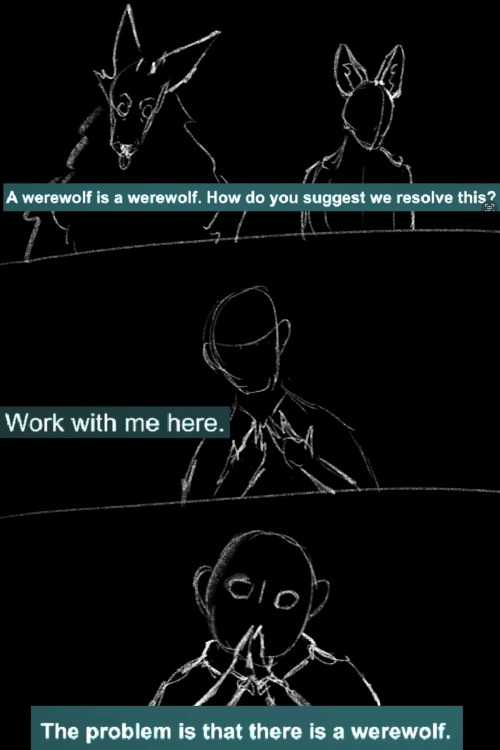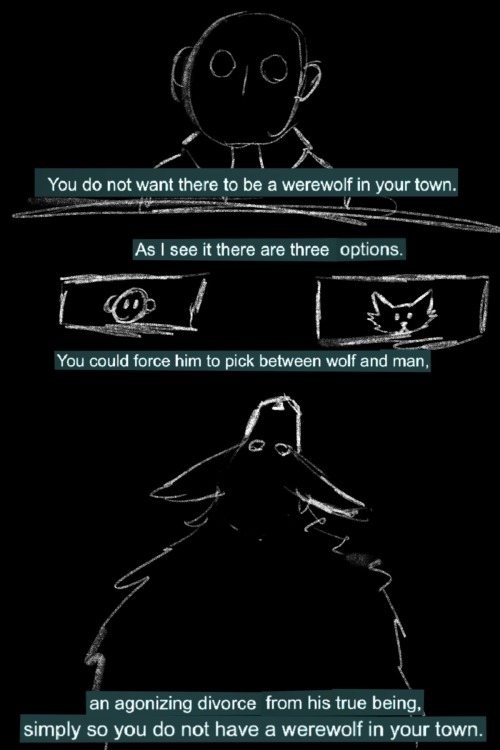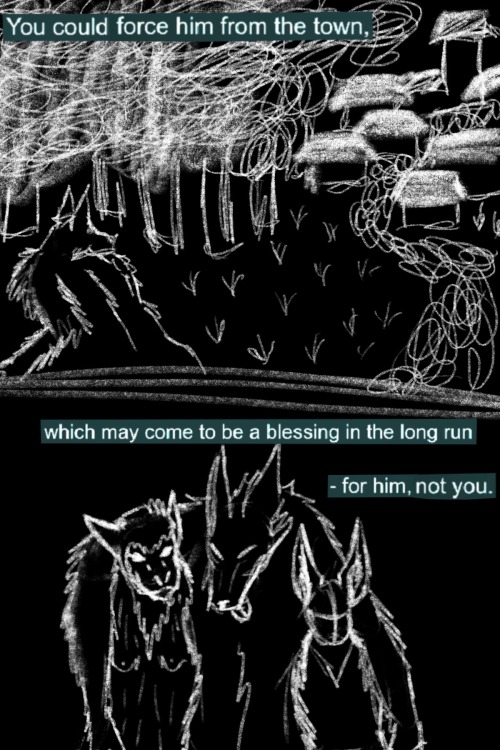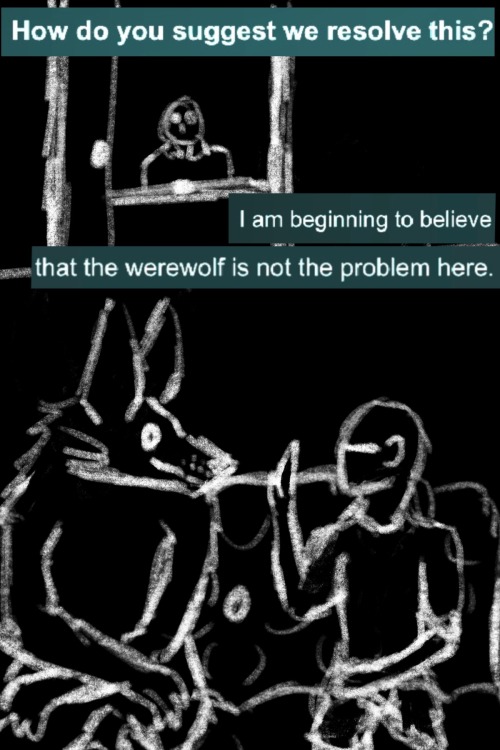“I’ve Been On The Other Side Of Dying For A Very Long Time.”
“I’ve been on the other side of dying for a very long time.”
“You mean the wrong side?” Derina’s voice teases and then leans in closer to murmurs, “This one’s much more fun.”
Her voice drawls on the last word, and Laila retorts, “Is that your plan? Die, resurrect, seduce an innocent man to depths of the ocean?”
“Hardly. You’re not a man, Ms. Kivris, or innocent for that matter.”
By the spirits, she’s an incorrigible flirt and probably responsible for a dozen stereotypes about sirens. Laila leans back to look at Derina better, the blood in her face running hot and keeps her mouth shut. She doesn’t trust her tongue enough right now.
The corner of Derina's lip curls up knowingly, her eyes wild and tipsy as they focus on her. Laila wets her lips and whispers, “What are you playing at?”
“Just a dance. We’ve got plenty of time until Marty kicks us out.” Derina tugs her hand but makes no motion to get up, brushing her thumb across Laila's knuckles.
More Posts from Ajkiranwrites and Others
my 10 holy grail pieces of writing advice for beginners
from an indie author who's published 4 books and written 20+, as well as 400k in fanfiction (who is also a professional beta reader who encounters the same issues in my clients' books over and over)
show don't tell is every bit as important as they say it is, no matter how sick you are of hearing about it. "the floor shifted beneath her feet" hits harder than "she felt sick with shock."
no head hopping. if you want to change pov mid scene, put a scene break. you can change it multiple times in the same scene! just put a break so your readers know you've changed pov.
if you have to infodump, do it through dialogue instead of exposition. your reader will feel like they're learning alongside the character, and it will flow naturally into your story.
never open your book with an exposition dump. instead, your opening scene should drop into the heart of the action with little to no context. raise questions to the reader and sprinkle in the answers bit by bit. let your reader discover the context slowly instead of holding their hand from the start. trust your reader; donn't overexplain the details. this is how you create a perfect hook.
every chapter should end on a cliffhanger. doesn't have to be major, can be as simple as ending a chapter mid conversation and picking it up immediately on the next one. tease your reader and make them need to turn the page.
every scene should subvert the character's expectations, as big as a plot twist or as small as a conversation having a surprising outcome. scenes that meet the character's expectations, such as a boring supply run, should be summarized.
arrive late and leave early to every scene. if you're character's at a party, open with them mid conversation instead of describing how they got dressed, left their house, arrived at the party, (because those things don't subvert their expectations). and when you're done with the reason for the scene is there, i.e. an important conversation, end it. once you've shown what you needed to show, get out, instead of describing your character commuting home (because it doesn't subvert expectations!)
epithets are the devil. "the blond man smiled--" you've lost me. use their name. use it often. don't be afraid of it. the reader won't get tired of it. it will serve you far better than epithets, especially if you have two people of the same pronouns interacting.
your character should always be working towards a goal, internal or external (i.e learning to love themself/killing the villain.) try to establish that goal as soon as possible in the reader's mind. the goal can change, the goal can evolve. as long as the reader knows the character isn't floating aimlessly through the world around them with no agency and no desire. that gets boring fast.
plan scenes that you know you'll have fun writing, instead of scenes that might seem cool in your head but you know you'll loathe every second of. besides the fact that your top priority in writing should be writing for only yourself and having fun, if you're just dragging through a scene you really hate, the scene will suffer for it, and readers can tell. the scenes i get the most praise on are always the scenes i had the most fun writing. an ideal outline shouldn't have parts that make you groan to look at. you'll thank yourself later.
happy writing :)
HEY, Romance Writers!
A few followers have asked for tips on writing romance into their stories or as the basis of their stories. Here’s a masterlist of sources (below cut) that may help.
General Romance:
What Defines Romantic Love?
How to Plot a Romance Novel
Slowburn Romance
When Friends Fall for Each Other (ask)
Tips for Writing a Character Who Has a Crush
Tips on Writing Unrequited Love
Writing Healthy Couples in Fiction
An Antidote to “Love at First Sight”
How Attractive Should Your Characters Be?
3 Great Ways to Show That Your Character Is In Love
6 Ways to Get Your Readers Shipping Like Crazy
Six Steps to Stronger Character Arcs in Romances
Seven Great Sources of Conflict for Romances
9 Romance Writing Mistakes to Avoid
20 Tips for Writing Lovable Romance Novel Heroes
How to Write a Kissing Scene in a Romance Novel
Types of Kisses and Kissing + This Post Is All About Kisses
List of Ideas to Keep Romantic Tension High
100 Questions for Character Couples
How Do I Make the Relationship Development Realistic?
How Do I Know If Two People Are Compatible?
Healthy Relationships Can Include Teasing
How to Write a YA Romance Without Cliché
Intercultural Romance:
How do I write an interracial couple accurately? (ask)
15 Common Stereotypes About Intercultural Relationships
Cross Cultural Relationships
14 Experiences in a Cross-Cultural Relationship
Things to Avoid When Writing Interracial Romance
writingwithcolor: Interracial Relationships (w/ links)
Bad Romance:
Things to Keep Out of Your Healthy Relationships!
Removing the Creeps From Romance
Why The Surprise Kiss Must Go
Possessiveness 101
10 Signs You May Be in an Emotionally Abusive Relationship
Edward & Bella Are In An Abusive Relationship
Red Flags, Verbal Abuse, Stalking… | Script Shrink
5 Huge Mistakes Ruining the Romantic Relationships in Your Book
How do you write a [bad] relationship without romanticising it? (ask)
General Tips for Writing Characters Love Interests:
How to Write from a Guy’s POV
Writing Awesome Male Characters: What You’re Doing Wrong
7 Point-of-View Basics Every Writer Should Know
How Do You Describe a Character?
4 Ways to Make Readers Instantly Loathe Your Character Descriptions
3 Signs Your Story’s Characters Are Too Perfect
Is a Quirk Just What Your Character Needs?
Six Types of Character Flaws
Is Your Character Optimistic Or Pessimistic?
5 Ways to Keep Characters Consistent
9 Simple and Powerful Ways to Write Body Language
10 Body Language Tricks for Deeper Characterization
Describing People Part Three: Gestures, Expressions, and Mannerisms
33 Ways To Write Stronger Characters
Conveying Character Emotion
Distinguishing Characters in Dialogue
How to Make Readers Love an Unlikable Character…
Characters: Likability Is Overrated
Relationships in General:
How to Create Powerful Character Combos
8 Secrets To Writing Strong Character Relationships
Character Relationships: 6 Tips for Crafting Real Connections
Writing Relationships: Hate to Love
Stereotypes, Archetypes, & Tropes:
Five Signs Your Story Is Sexist: Part 1, Part 2
Five Signs Your Story Is Sexist – Against Men
Always Female vs Always Male
Born Sexy Yesterday & Manic Pixie Dream Girl
7 (Overused) Female Love Interests
Other Resource Lists
Resources For Romance Writers
thewritershelpers FAQ (romance, kissing, sexuality, etc)
#romance | WordsnStuff
#romance | Hey, Writers!
—
+ If you enjoy my blog and want continued updates, please consider sending a little thank you and Buy Me A Coffee!













A comic based on this poem
I skip and trip down the stairs
tag yourself. do you skitter, scuttle, scurry, or scamper.
So much thoughts, too less time... I've got so many vignettes in my head alreadyyy
30 Days Writing Challenge
Write about a first kiss
Write a scene without any dialogue
Use the words: kitchen, date, music
Write about your MCs personal style
Write 100 words today
Write about a blackout
Use the words: small town, bar, jukebox
Write about finding a new hobby
Write about a heated debate
Use the title: Promises made, promises kept
Write about two characters dancing together
Explain your MCs motivation
Write 10 sentences about the last item you bought
Write about regret
Write about a girl's night
Write about a "thank you"
Write about a car ride
Use the title of the last song you've listened to
Write a summary for a book you would love to read
Write a new piece of lore for your WIP
Write something angsty
Write for 15 minutes without deleting anything
Write about dreaming
Use the woords: crown, dance, smile
Write a scene that describes your MC well
Use the title: Like waves in the ocean
Write an ending without a beginning
Write only the dialogue for a scene
Write about your MCs nicknames
Write about a concert
If you're reading this...
go write three sentences on your current writing project.

Making Fight Scenes Sound Nicer
Euphonics is all about how the words "feel". By incorporating certain sounds, you can influence the mood of the passage.
Mood: Foreboding
use words with 'ow', 'oh', 'ou', 'oo' sonds. These are good for building tension before the fight.
moor, growl, slow, wound, soon, show, show, grow, tow, loom, howl, cower, mound.
Mood: Spooky
use words with 's' sounds, combined with an 'i' sound.
hiss, sizzle, crisp, sister, whisper, sinister, glisten, stick.
Mood: Acute Fear
use word with 'ee/ea' sounds, with a few 's' sounds.
squeal, scream, squeeze, creak, steal, fear, clear, sheer, stream
Mood: Fighting Action
use short words iwth 't', 'p' and 'k' sounds.
cut, block, top, shoot, tackle, trick, kick, grip, grab, grope, punch, drop, pound, poke, cop, chop.
Mood: Speed
use short words with 'r' sounds
run, race, riot, rage, red, roll, rip, hurry, thrust, scurry, ring, crack
Mood: Trouble
use words with 'tr' sounds to signal trouble
trouble, trap, trip, trough, treat, trick, treasure, atroscious, attract, petrol, trance, try, traitor
Mood: Macho Power
If you wan to emphasize the fighters' masculinity, use 'p' sounds.
pole, power, police, cop, pry, pile, post, prong, push, pass, punch, crop, crap, trap, pack, point, part
Mood: Punishment
If your fight involves an element of punishment use 'str' sounds
strict, astride, strike, stripe, stray, strident, stroke, strip, instruct, castrate strive
Mood: Defeat
use 'd' sonds
despari, depressed, dump, dig, dank, damp, darkness, drag, ditch, drop, dead, deep, dark, dull
Mood: Victory
use 'j' and 'ch' sounds
joy, cheer, jubilant, jeer, chuck, chariot, choose, chip, jest, jamboree, jig, jazz, jive, rejoice, rejoin
In print, the effectiveness of such euphonics will be very subtle, and it can only serve as an embellishment to what you already have.
Don't use or replace words for the sake of achieving euphonic effects, but this can be something to keep in mind when you are editing your draft!
─── ・ 。゚☆: *.☽ .* . ───
💎If you like my blog, buy me a coffee☕ and find me on instagram!
💎Before you ask, check out my masterpost part 1 and part 2
💎For early access to my content, become a Writing Wizard
20 Plot Twist Ideas That Will Shock Your Audience
One of the most effective tools in a storyteller's arsenal is the plot twist. A well-executed plot twist can leave your audience reeling, questioning everything they thought they knew about your story. It can turn a good story into a great one, leaving a lasting impact on your readers or viewers. In this post, we'll explore 20 plot twist ideas that will shock your audience and elevate your storytelling game to new heights.
1. The Unlikely Hero:
Turn the tables by revealing an unexpected character as the true hero. This can be someone seemingly insignificant or even an antagonist who redeems themselves at a crucial moment.
2. The Double Agent:
Introduce a character who initially appears loyal to the protagonist but is secretly working against them, only to later reveal their true intentions.
3. The Long-Lost Sibling:
Uncover a secret sibling, separated from the main character in their early years, and use their sudden appearance to shift the narrative.
4. Time Travel Paradox:
Play with time travel to create a paradox that forces the characters to confront alternate timelines or unforeseen consequences of their actions.
5. The Mastermind:
The story's villain is revealed to be a puppet in a larger scheme, controlled by a mastermind who has been operating behind the scenes.
6. The Supernatural Twist:
Introduce a supernatural element, like ghosts or mythical creatures, that the characters and audience believed were mere myths.
7. The Doppelgänger:
A character's doppelgänger appears, causing confusion and chaos as they try to determine who is the real one.
8. The Reversal of Roles:
Switch the roles of the protagonist and antagonist halfway through the story, making the audience question their allegiances.
9. The Untouchable Hero:
Create a seemingly invincible hero who unexpectedly meets their match, forcing them to reevaluate their abilities and tactics.
10. The Forgotten Past:
Unearth a character's forgotten or repressed memories, leading to a shocking revelation about their true identity or past actions.
11. The Betrayal Within:
One of the protagonist's closest allies betrays them, throwing their entire mission into disarray.
12. The Hidden Identity:
A character is not who they claim to be, and their true identity is revealed, impacting the story's direction.
13. The Inception Twist:
Blur the lines between reality and illusion, leaving the audience guessing what's real and what's a dream or illusion.
14. The Time Loop:
Trap your characters in a time loop where they're forced to relive the same events repeatedly until they can break free.
15. The Shapeshifter:
Introduce a character with the ability to change their appearance, creating doubt and suspicion within the group.
16. The Truth About the Mentor:
The mentor figure, who initially seems wise and benevolent, is unveiled as the story's true antagonist.
17. The Lost Artifact:
The much sought-after artifact or treasure turns out to be a fake, and the real item is something entirely unexpected.
18. The Pseudo-Death:
Fake a character's death to shock the audience and later reveal they were alive all along.
19. The Prophecy Reversed:
Subvert the traditional hero's journey by defying a prophesized destiny and taking the story in a different direction.
20. The Unreliable Narrator:
Reveal that the narrator has been lying or misrepresenting events, casting doubt on the entire story's accuracy.
Conclusion:
These 20 plot twist ideas are just the beginning, and by incorporating them into your narratives, you can leave your audience stunned, shocked, and eager for more. Remember that the key to a successful plot twist lies in its execution, so take your time and craft a twist that seamlessly integrates into your story, making it an unforgettable experience for your readers or viewers.
now say it with me: authors/artists dont owe you moral purity. an author/artist job is not to hold you by the hand & tell you exactly what is Good™ & what is Bad™. you should be able to think for yourself
-
 alchemicalwerewolf liked this · 1 year ago
alchemicalwerewolf liked this · 1 year ago -
 adeleblaircassiedanser liked this · 1 year ago
adeleblaircassiedanser liked this · 1 year ago -
 ajkiranwrites reblogged this · 1 year ago
ajkiranwrites reblogged this · 1 year ago

Original Work Primary Blog. Sideblog for fanfics @stickdoodlefriend Come yell at me! | 18+
241 posts